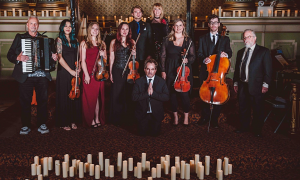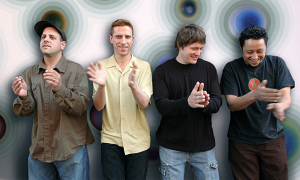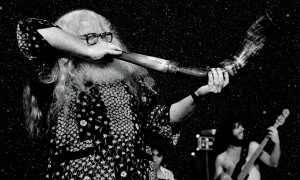Home » Jazz Articles » From the Inside Out » Instru-Mental Ill-ness
Instru-Mental Ill-ness
There's more whacked-out shit flying around 'V2V' than you would even find onstage at the conclusion of the national Republican or Democratic party conventions.
 Medeski Martin & Wood
Medeski Martin & Wood
End of the World Party (Just in Case)
Blue Note
2004
Teaming the poster children for contemporary bass / drum / organ groove (Chris Wood, Billy Martin, and John Medeski, respectively) with John King, the producer of such twisted GenX pop classics as Odelay (Beck) and Paul's Boutique (Beastie Boys), updates the classic "Booker T. & The MGs" organ combo sound for our swirling electronic age.
King's deft production here is sleek, not slick, and works Mark Ribot's sharp guitar into several tracks. Just like modern life, this isn't entirely a groove. "Ice" is a tone poem cold and dark and hard, for example, and you may not have to look much further than the title of "Bloody Oil," set to Wood's recurring bass figure and Medeski's haunted house organ swells, to learn how MM&W feels about the war in Iraq.
But when it IS time to party, the troops still kick it balls-out funky. Martin whacks "Shine It" and "Curtis" with a rhythm-stick taped together from New Orleans second-line and '60s boogaloo drum styles, while Medeski's cool, spare acoustic piano in "Mami Gato" wastes neither motion nor note and honors such spinners of classic soul piano grooves as Les McCann and Ramsey Lewis, even against the floating time the rest of the ensemble seems to play. Medeski leads the group through liquid organ grooves in the title track and "Queen Bee," stung as if by a swarming hornet by Ribot's sharp, Steve Cropper-ish guitar licks (this sounds so much like Booker T. & The MGs that it's got to be intentional).
Ribot's concise chops slice nicely into the thick organ stew of "Reflector" while the band tosses off sharp chords that propel the rhythm and beat forward, and the tumultuous "Sasa," also pierced by Steven Bernstein's slide trumpet like a siren screaming through an icy starless winter night.
 Katahdin's Edge
Katahdin's Edge
Step Away
Incline
2004
Named for the mountain that forms the northern terminus of the Appalachian Trial, Katahdin's Edge presents a more traditional jazz keyboard trio mainly led by the acoustic piano of composer Willie Myette (who composed and produced all eight selections here) with drummer Mike Connors (also of Combustible Edison) and bassist John Funkhouse (leader of his own band, FunkHouse).
Myette's articulate, intelligent constructions intimate toward Bill Evans' soaring flights of spontaneous, adventurous creativity, especially as "Wagons of the Night" and "Full Circle" tumble toward their conclusions like roaring, untamed musical waterfalls. His songs also feature a sense of simple - not simple-minded or simplistic, but uncluttered - reverence toward beauty that in its best moments suggests Keith Jarrett lost in reverie or the Pat Metheny Group (especially the Groups with lyrical pianist Lyle Mays).
But as principal solo voice Myette's bows most often to such Latin-tinged names as Vince Guaraldi and Chick Corea. His piano sparkles with classic and modern jazz and Spanish and Russian influences that stream like spring water through his flowing melodies. He dances a laughing tango in "Enigma," where Connors softly thumps Latin percussion to stroll with Funkhouse's bass solo, and nimbly twirls Latin rhythms to end "Soulmates." His left piano hand, in tandem with the bass, supplely navigates the rhythmic footing to the Russian-sounding, galloping horse melody and thunder of "Zargonic Effect."
Myette's playfully yet sadly gorgeous melodies of "Wagons of the Night," "Traveler in the Dark" and "Full Circle" strike warm, beautiful pastoral chords, marked in time by sketched bass and drum brushstrokes, and climax in celebratory, joyous noise. Not simple. Simply beautiful.
Step Away proves a more than worthy addition to the modern jazz piano trio catalog.
 IsWhat?!
IsWhat?!
You Figure It Out...
Hyena
2004
Merging jazz and hip-hop has generally proved more risk than reward, but IsWhat?! takes a fearless plunge into these troublesome waters.
Matt Anderson (upright and electric bass), Jack Walker (saxophones and flute) and Napoleon Maddox (vocals) make quite a splash with the sound of their debut. Guest drummer Hamid Drake (Don Cherry, Herbie Hancock, David Murray) and DJs / mixmasters John Doe and The Animal Crackers help rock the beats: Imagine the sound of Digable Planets with bassist Charles Mingus and saxophonist Pharoah Sanders sitting in. You can almost hear that sound come alive in "Thump Loop & Scratch," an ambitious interplay between saxophone, bass, and turntables.
The trio creates jazz-hop fusion by retaining disciplines important to each style. Jazz (some jazz, anyway) and hip-hop (for sure) both benefit from thumpin' bass, and young pup Anderson could sure teach some old dawgs how to rock the house on a funky upright. He pounds the bottom out of Mingus' "Fables of Faubus," then reworks Mingus' "Haitian Fight Song" as the introduction to "Trust," which he underpins with his hard-driving walking bass line.
Maddox hits his highspot in "Trust" with the set's best wordplay: "Trust don't work/ In a world like this/ You've got to watch your back/ It's just ridiculous/ You can be naïve/ If you want to/ But don't expect everybody/ To love you." He's a genuine rapper, punching out "Cold Hands" old-school hard like LL Cool J, flowing more liquid in "Can't Get In."
"Cold Hands" cooks up another hot jazz-hop patty melt from Anderson's thump, drum loops, John Rusza on cuica and especially Liz Wu's vibraphone improvisation, which runs throughout the entire piece. DJ Spinna's club-by remix of "Cold Hands" is sequenced immediately after the original version, which makes it hard to distinguish between the two.
More promising jazz-hop fusion than most, and it will be intriguing to see where IsWhat?! goes from here. It also brings to mind an old saying that's usually brought up in conversations about racial harmony but also applies to this merging of two musical genres: "Our differences show on the surface, but our sames cut down to the bone."
 Dub Trio
Dub Trio
Exploring the Dangers Of
ROIR
2004
Dub is minimalist by definition: Reggae music deconstructed then rebuilt in deep echo and reverb (and, one suspects, plenty of thick, gummy smoke) to emphasize the hypnotic power of its repeating, resounding bass and drum.
Dub is almost always a creature of the studio by definition too. But Exploring the Dangers Of dub is played and recorded in mostly real-time by DP Holmes (guitar / keyboards / dubs), Stu Brooks (bass / keyboards / dubs), and Joe Tomino (drums/ percussion / melodica / dubs) with minimal overdubs (mostly melodica, for the classic sunny reggae sound).
A few other flavors subtly come through: "Casting Out the Nines" moves on a pulse much closer to electro- or techno-pop than the classic chicka-chick reggae rhythm, and "Real Wicked Ways" opens in a crashing, burning industrial music frenzy before nestling into its somnambulant dub. Holmes seems to have immersed himself in the Andy Summers school of reggae guitar, adorning tracks with oddly-shaped figures and flourishes ("Sick Im Kid").
I know that dub IS by definition minimalist. But, unless I'm missing something, it just doesn't sound like there's much of anything going on here beyond the deep rhythmic undertow. The last three tracks, recorded from the stage at a NYC club performance, step a bit more lively, ripping open the "Awakening Dub;" a harsh, sinister revisiting that terrorizes "Sick Im;" and dancing with the inscrutably and humorously titled "Fur Boots on the Party Moose" in between.
 Bill Laswell
Bill Laswell
Version 2 Version: A Dub Transmission
ROIR
2004
Bassist, composer, and producer Laswell here reconvenes with several co-conspirators from previous dub and other world-beat projects: Keyboardist Bernie Worrell, drummer / percussionist Abdou Mboup, percussionist Karsh Kale (who served with Laswell in Tabla Beat Science and in the rhythm section for Herbie Hancock's acclaimed Future 2 Future set), and bassist Jah Wobble.
I get Laswell's dub, or at least I think I do. It's Miles Dewey Davis dub: No musical instrument, rhythm, style, or sound is "out of bounds" so long as you can make it work. And there's more whacked- out shit flying around V2V than you would even find onstage at the conclusion of the national Republican or Democratic party conventions.
V2V serves Laswell's trademark dark and potent brew, bubbling from a deep cauldron. Though its basslines and riddims are dub based in reggae, it expands to sources beyond the Caribbean by incorporating Indian and African percussion rhythms from Kale and Mboup - not just reggae dub, but world dub, you might say, dynamic and panoramic. The ringing cycle and telephone bells and subtle yet clattering percussion break in "Dystopia," the tabla pulses tiptoeing alongside the hard beat of "Simulacra," and more, contribute subtle but necessary harmonic and melodic spice.
Electric guitar (uncredited but most likely from Laswell) enlivens the dub with exotic effects and phasing as rhythm in "Simulacra" and as a psychedelic sub-aquatic electric blues which claws through the murky thickness of "Space-Time Paradox" and "Babylon Site" like a desperate drowning man.
Still, this set sounds like every song was written - as it was - by one bassist (Laswell) or two (Laswell with Wobble). Just walk down the street humming the bass-ic thump to "Babylon Site," even once, then see how many days it takes you to shake it.
Tags
PREVIOUS / NEXT
Support All About Jazz
 All About Jazz has been a pillar of jazz since 1995, championing it as an art form and, more importantly, supporting the musicians who make it. Our enduring commitment has made "AAJ" one of the most culturally important websites of its kind, read by hundreds of thousands of fans, musicians and industry figures every month.
All About Jazz has been a pillar of jazz since 1995, championing it as an art form and, more importantly, supporting the musicians who make it. Our enduring commitment has made "AAJ" one of the most culturally important websites of its kind, read by hundreds of thousands of fans, musicians and industry figures every month.





















